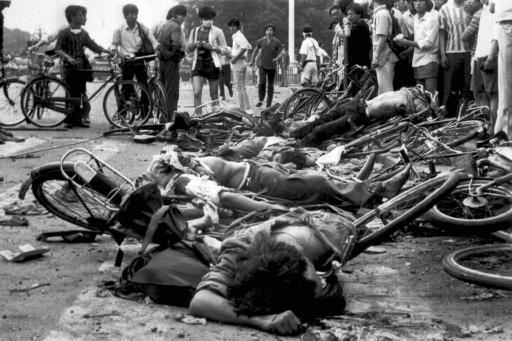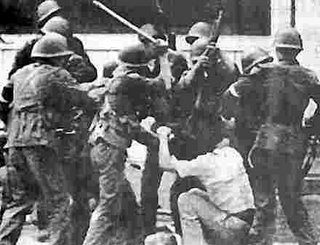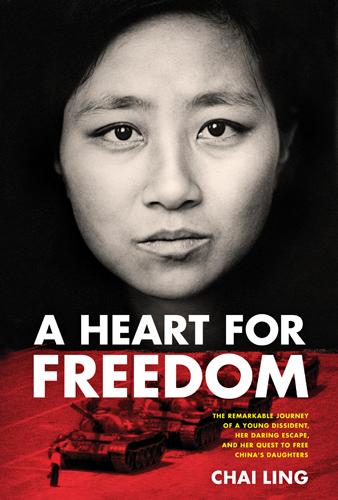In the spring of 1989, a young, idealistic Beijing college student found herself leading one of the most well-known student protests ever — which turned into one of history’s most vicious massacres.
Here’s a video that will bring back memories of what happened at Tiananmen Square:
The Chinese government’s violent repression of the peaceful student-led protest in Beijing’s main square led to widespread international condemnation — which the Chinese leadership ignored. The 100,000-strong gathering had been the culmination of months of pro-democracy demonstrations. The Soviet Union had collapsed. Freedom was spreading across the globe — and Chinese students were sure they could bring democracy to China, too.

Instead, tanks and troops were sent in. Hundreds died, up to 10,000 were injured, and widespread arrests, trials, and executions followed. Tanks rumbled through the capital’s streets, randomly firing on unarmed protesters. The injured were rushed to hospital on bicycle rickshaws by frantic residents shocked by the army’s sudden and extreme response.
Although violence had been predicted, the ferocity of the attack took most by surprise. President George H.W. Bush deeply deplored the massacre. British Prime Minister Margaret Thatcher told the press she was “shocked and appalled by the shootings.”
Hospital operating rooms were filled with casualties with gunshot wounds, many of them local residents who had not taken part in the protests. Reports emerged of troops searching university campuses for ringleaders — beating and killing those they suspected of co-ordinating the protests.
Much of the violence was blamed on drugged, semi-literate infantry conscripts from rural provinces worked into a frenzy, promised they would be national heroes for saving China. They coldly shot, beat and bayonetted students and ran them down with armored vehicles.

In the midst of this were a number of student leaders, including young Chai Ling whose parents were members of the Communist Party. As a young student Chai had joined the Central Communist Youth League, which named her a “model student” during high school for her “good health, grades and moral character,” reported Paula Chin of People magazine.
She began participating in the demonstrations although she realized that speaking out could have enormously negative political implications. Along with other student leaders such as Wu’erkaixi, Feng Congde and Wang Dan, she was listed as one of the 21 most wanted students by the Chinese government after the military crackdown.
 In her new book Heart for Freedom from Tyndale House, she tells of staying at Tiananmen Square until the very last — when it was hopeless. Then in the chaos of gunfire, death, blood and terror, she and others disappeared.
In her new book Heart for Freedom from Tyndale House, she tells of staying at Tiananmen Square until the very last — when it was hopeless. Then in the chaos of gunfire, death, blood and terror, she and others disappeared.
They had no ties with any subversive underground and no idea how to avoid being caught. She describes her flight to freedom as purely miraculous.
In interviews, Feng has described encountering an eccentric movement of deep-breathing exercise enthusiasts — who took great risks in hiding Feng and Chai, but were willing to help because they believe human life is sacred.
The two hid in a forest for three months, then spent time in such unlikely hiding places as a shipping crate. Sometimes, people helping them gave the students all the money they had saved — in hopes they would make it to the West to tell the world what had happened.
Chai made it across the border into Hong Kong, then settled in Paris, accepted a full scholarship to Princeton University and went on to acquire a Masters of Business Administration at Harvard Business School in 1998.
In the process of finding her way to freedom, she called out to God. He answered her cry, she writes.
As she started a new life in the U.S., she founded a company, Jenzabar, which today provides software to universities across the U.S., and started a nonprofit called “All Girls Allowed” with the aim of publicizing today’s human rights violations perpetrated by the Chinese government in their forced one-child policy.
She tells in her book how girls have borne the brunt of the one-child policy since Chinese parents often choose to abort females or abandon them after birth to orphanages — seeking a male heir to perpetuate the family name and support them in their old age. Many abortions, however, take place through force as the government tracks down pregnant women who already have a child and force them — even in the final weeks of their pregnancy — to comply with the one-child policy.
It is estimated that more than 100 million girls have not been allowed to be born. In some provinces, there are 130 boys surviving for every 100 girls. The suicide rate is also high among Chinese women — estimated at five times the world average — and is the most common cause of death for Chinese women ages 15 to 34.
After escaping, disappearing underground and working her way out of the country, finding peace with God, then making a new life for herself in the United States, Chai writes of her disillusionment with a dramatically changed China where the Tiananmen Square Massacre is not mentioned and the vast majority submit to the government’s brutal hand in exchange for financial prosperity. She describes their complacency with a heavy heart.
But she also shares hope:
“God used the Tiananmen events to save me and free. He used everything that happened afterward to break my dependence on friends, comrades, connections, the media, the public, the legal system and law enforcement so I could see I’m completely helpless unless I trust and rely only on Him.
“When I thought I was giving my life to Jesus so He would save China, little did I know that the first ones saved would be me and my family.
“I no longer live in fear, for I know that God Almighty is holding my right hand and watching over me and my true big brother, Jesus, will be with me until the very end.
“Even better, it is no longer my battle to fight or to win — it’s His. All I have to do is take up my position, stand firm and watch for God’s deliverance.
To get your copy of this remarkable book, CLICK HERE.

